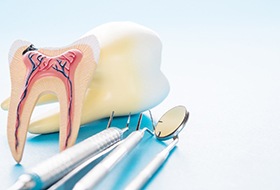Root Canal Treatment – West Hartford, CT
Hurting Tooth? We Can Help!
Is one of your teeth hurting…like really hurting? Is your toothache so bad that it’s causing you to miss work or school? If so, then the problem is likely damaged or infected dental pulp. This is essentially the “nerve” located inside all of your teeth, and problems with it usually cause one main symptom: PAIN. Fortunately, Dr. Phadnis has just the solution: root canal treatment. Despite its dubious reputation, it is actually one of the best ways to relieve severe dental pain. Plus, it can save even the most damaged teeth from extraction!
Why Choose West Hartford Dental Group for Root Canal Treatment?
- Same-Day Appointments Available
- Friendly Team of Dental Specialists
- Accept All PPO Dental Insurance
Do I Need Root Canal Treatment?

Sometimes, decayed and otherwise damaged teeth can be restored with a tooth-colored filling or dental crown. Once the damage has impacted the pulp, however, root canal treatment becomes necessary. The following symptoms are often warning signs that this tooth-saving service is necessary:
- A persistent toothache.
- Pain when biting down.
- Dark discoloration on the tooth the pain is stemming from.
- A blister or pimple-like bump on your gums.
- Bleeding, swollen, or inflamed gums.
Important note: Although pain is a common sign that root canal treatment is needed, it’s not the only one. If your once painful toothache is no longer causing you discomfort, it could be because the infection has “killed” the nerve of your tooth. That’s why it’s so important to get in touch with our West Hartford dental team the moment any abnormal symptoms arise – even if they seem small!
The Root Canal Process

The truth is that modern-day root canals are safe, effective, and virtually painless. So why do so many people think otherwise? It’s because the pain associated with the initial dental problem often gets falsely attributed to the procedure itself. At West Hartford Dental Group, a patient is completely numbed at the beginning of the treatment. That way, they receive a painless root canal experience when our West Hartford emergency dentist removes the pulp, cleans the tooth, fills it, and rebuilds it with a restoration.
The Benefits of Getting a Root Canal

Perhaps one of the most noteworthy benefits is that root canal treatment allows us to save your tooth, benefiting the look, health, and function of your smile. As we mentioned above, the procedure is also completely painless thanks to our gentle approach and powerful numbing agents. So, if you’re worried about experiencing any discomfort, don’t worry – this treatment is designed to alleviate pain, not cause it. Finally, any list about the benefits also wouldn’t be complete without mentioning that the restorations used to protect your treated tooth are extremely lifelike in look and function!
Understanding the Cost of Root Canal Treatment

No one wants to get a root canal. However, sometimes one is necessary to preserve your tooth, saving it from a future extraction. Many people put off their treatment because they are worried about the cost. Every patient is different, so the cost of your treatment can vary on various factors. During your visit with us, we will go over the estimated cost in detail. Until then, here are some things to take into consideration.
Factors That Can Affect Root Canal Cost

We won’t be able to determine the exact cost of your root canal treatment until we see you in person. This is because there are many factors that we consider. Here are the most prominent ones.
- Location: Depending on where the affected tooth is located, the cost will vary. Molars have more roots than teeth in the front of the mouth, so they take longer to treat.
- Difficulty: The more complex the procedure, the higher the cost is.
- Additional Treatments: Sometimes, patients need another service, like a dental crown, in addition to their root canal. This cost should also be taken into account.
Is It Cheaper to Pull My Tooth?

Many people are tempted to skip the root canal process and have their tooth extracted instead. However, this isn’t an ideal solution. The cost for the tooth extraction is lower upfront, but you also need to consider the long-term consequences of losing one of your natural teeth. After an extraction, your bite can be negatively impacted as the surrounding teeth shift out of place to fill the space. This results in difficulty chewing and general discomfort. To prevent this, you would need to replace your missing tooth with a dental bridge or dental implant. The cost of the options add up quickly, so root canal treatment is a more cost-effective, long-term solution.
Does Dental Insurance Cover Root Canal Treatment?

Root canal treatment is usually considered by dental insurance providers to be a major restorative treatment. That means that the treatment is covered up to 50% after your annual deductible has been met and before the maximum has been exceeded. Just keep in mind that every plan is a little bit different, so it is best to confirm this ahead of time so that you don’t run into any surprises. At West Hartford & Wethersfield Dental Group, we are proud to accept virtually all PPO dental insurance plans!
Other Options for Making Root Canal Treatment Affordable

If you don’t have dental insurance, this doesn’t mean that you are completely on your own. With our in-office dental plan, you can save on treatments completed at our practice. We are also happy to accept payments through CareCredit – a third-party financing company that can split the cost of your treatment into manageable monthly installments with little to no interest.
Root Canal Therapy FAQs
How Much Pain Is Normal After a Root Canal?
Thanks to anesthesia and local sedation, you should feel very little during the root canal procedure itself. Some patients remark that it feels like getting a small filling.
After the sedation and anesthesia wear off, though, you can expect to experience a degree of pain and sensitivity. Over-the-counter pain relievers, along with rest and a soft diet, can help you to stay as comfortable as possible while you are healing. Most patients find that the pain begins to subside within three days or so.
If you experience severe pain or have other concerns during your recovery, you should call our team right away.
What Should I Do Before a Root Canal?
There are a few steps you should take before your procedure:
- Eat a healthy, satisfying meal. You might not feel like eating after your procedure, so unless our team tells you otherwise, you should fill up before your appointment.
- Stay away from alcohol and tobacco. These substances can slow down your body’s ability to heal.
- Take a pain reliever. A dose of ibuprofen or acetaminophen taken prior to your appointment may reduce soreness afterward.
- Get a good night’s sleep. Being well-rested can reduce any anxiety that you may feel. It can also fortify your immune system.
How Long Do Root Canals Last?
Root canal therapy is consistently successful. The majority of treated teeth go on to provide years of reliable function. In fact, under ideal circumstances, the results of a root canal can last throughout a patient’s lifetime.
However, if the tooth suffers fresh damage or injury, or other unfortunate circumstances arise, you may need root canal retreatment. You should visit us regularly so we can monitor your treated tooth.
What Happens if You Wait Too Long for a Root Canal?
If you delay root canal therapy for too long, the damage to your tooth is likely to worsen. In fact, it might reach the point where you are no longer a candidate for a root canal; you might need to get the tooth extracted instead.
In a worst-case scenario, the infection in the damaged tooth will spread into the surrounding tissues. It could damage your gums and jawbone. It might even cause systemic illness. In rare cases, patients have passed away due to not receiving timely care for an infected tooth.

